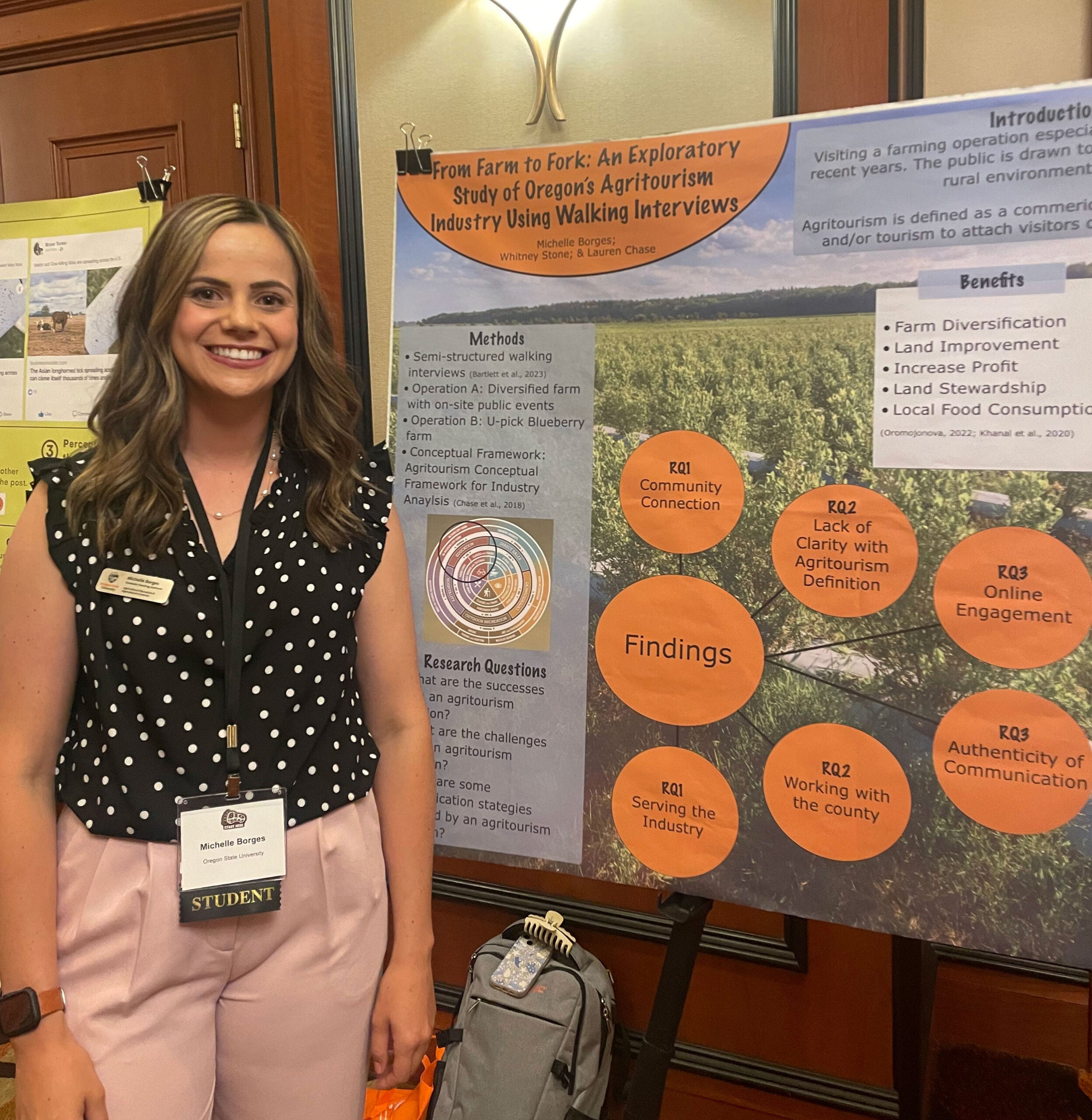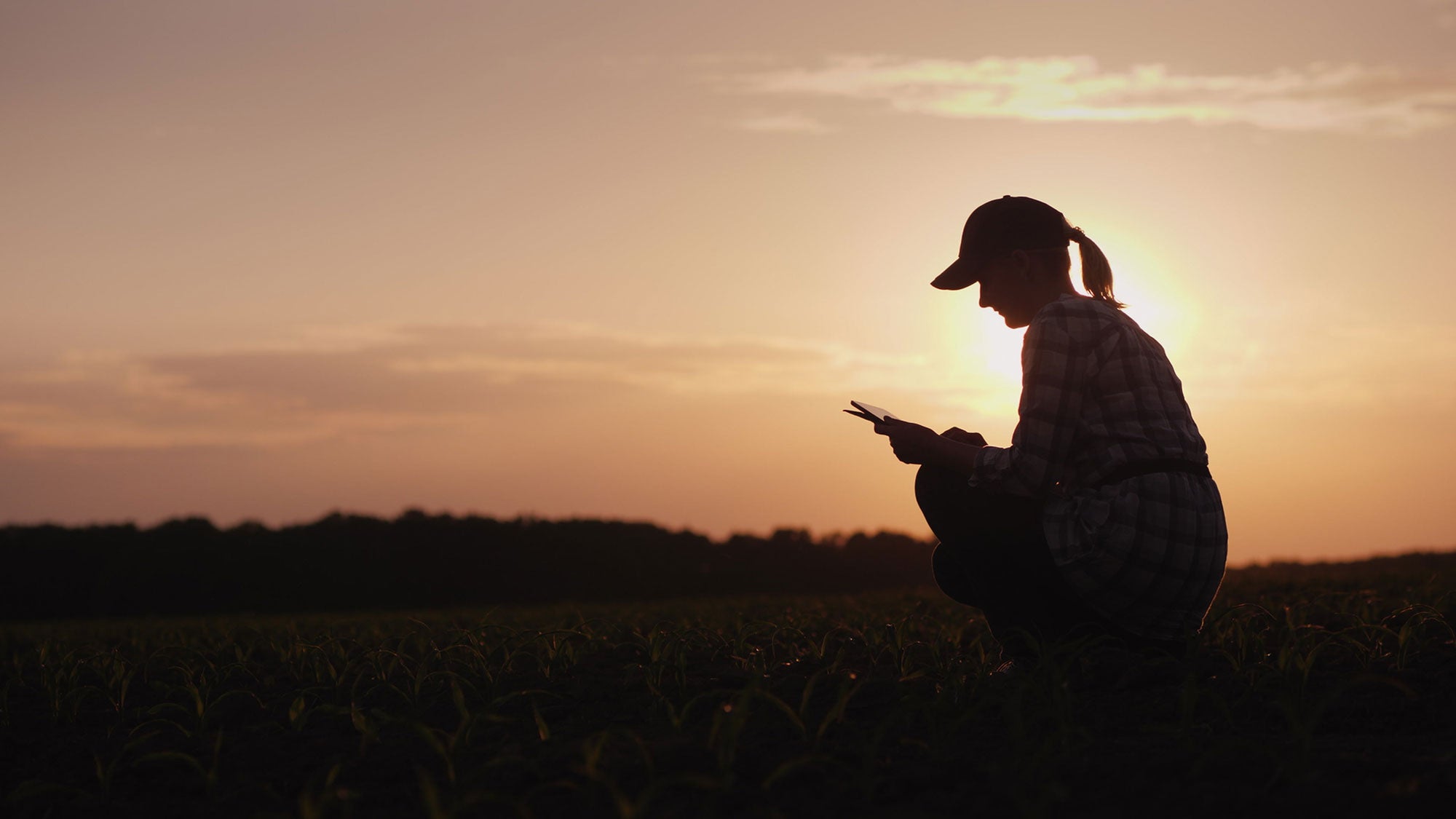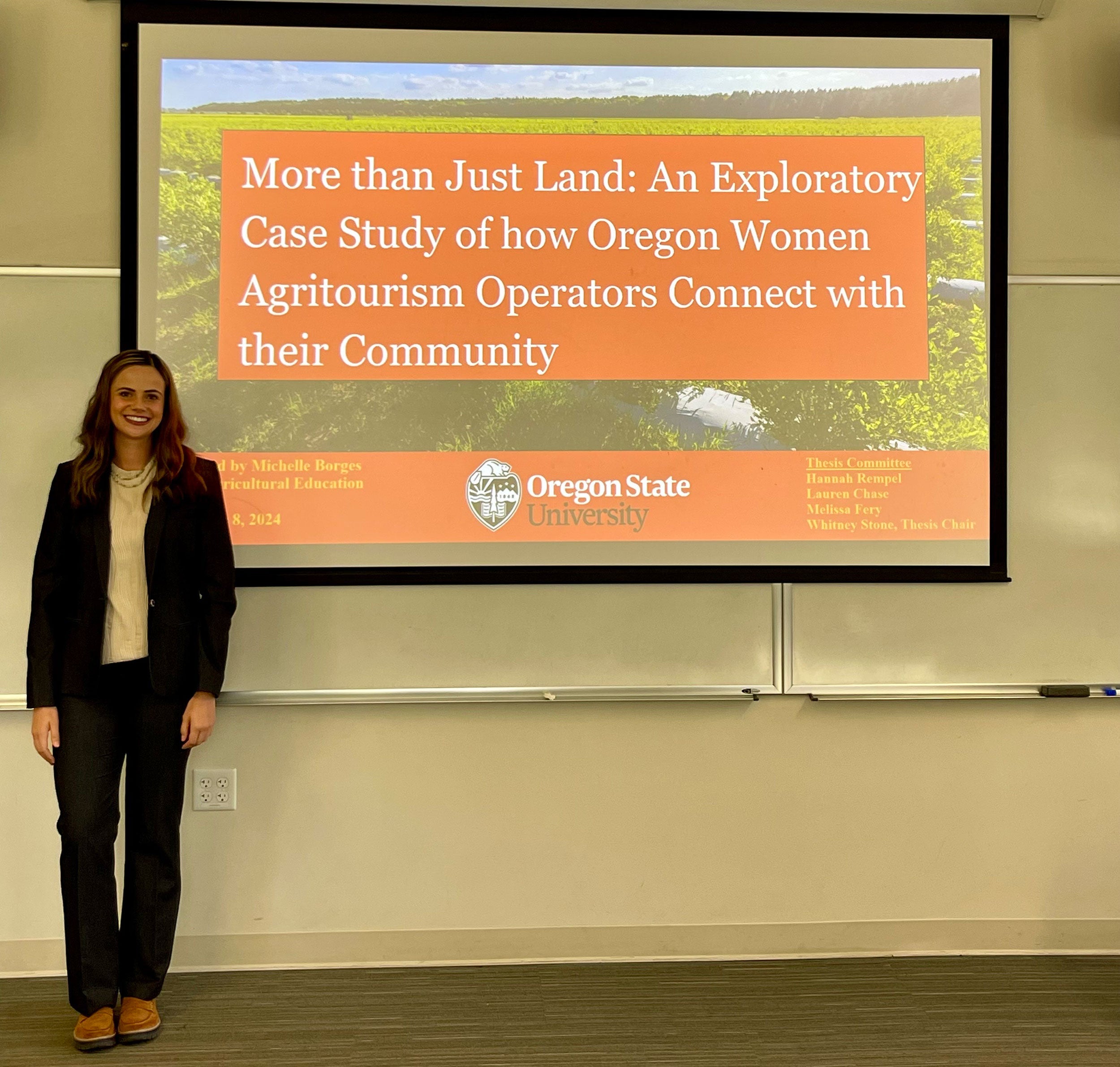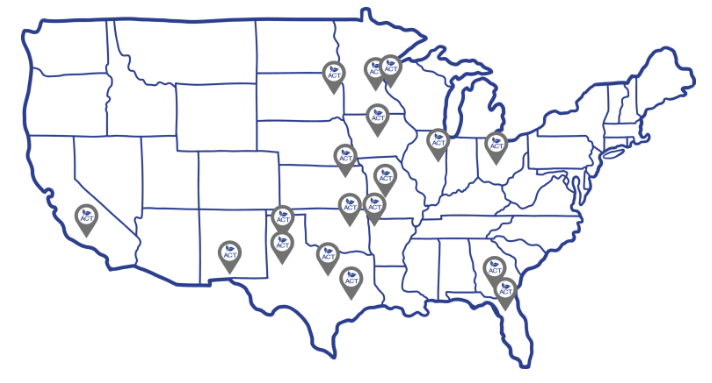In California, a state renowned for its agricultural output, Michelle Borges had been forging a path in a field that remains surprisingly underrepresented: agricultural communication.
As one of the first graduates of California State University, Chico’s newly founded agricultural communication and leadership program, Borges is now furthering her education at Oregon State University, where she’s helping to establish agricultural communication at the graduate level. Borges’ pioneering work in this field in the Western U.S. emphasizes the need for more visibility and professional opportunities in a sector so largely concentrated in the Midwest.
Borges’ journey into agricultural communication began when she decided to attend Chico State to study agriculture, she said. Growing up in Oakdale, California, she was deeply involved in her local 4-H and FFA chapters, which ignited her passion for agriculture early on. However, she knew that the traditional agricultural education path, with its focus on in-class instruction and FFA leadership, wasn’t quite the right fit for her.
Borges had her sights set on a different form of agricultural literacy.
“I didn’t know where I wanted to go to school, but I knew I wanted to do ag comm,” Borges said. She also said she “enjoyed the social aspect of [FFA and 4-H] , like community outreach and collaboration.”
Determined to carve out her own path, Borges reached out to faculty at Chico State to explore the possibility of studying agricultural communication. Fortunately, the faculty saw her vision and shared that a program was in the works. They reassured her that by the time she would graduate in 2023, a program would be offered as part of the newly updated agricultural sciences major.
“They explained that it would essentially be a split program between the Colleges of Agriculture and Communication & Education, which offered some really unique perspectives,” she said.

Of course, there were growing pains along the way.
The faculty and Borges were navigating uncharted waters, figuring out what the curriculum would look like and how to structure a program that didn’t yet exist.
But in fall 2021, Chico State officially introduced agricultural communication and leadership as an option within the agricultural sciences major.
In the program, students learn about agriculture as both an industry and a science while developing leadership skills within agricultural institutions. Alongside this, they take journalism and communication studies classes necessary to practice mass communication, with the option to explore media arts and design technology for additional skills, such as commercial photography and audio production.
In spring 2023, Borges, alongside classmate Claire Broaddus, became the first graduates of this newly established program, marking a milestone for Chico State and for the growing field of agricultural communication — especially in the West.
Other factors that influenced her decision to pursue this field include combatting misinformation and embracing the power of storytelling, Borges said. She believes that farmers and other people in agriculture deserve more recognition in the media than they get.
“The negative misconceptions that fields like agriculture, food production, and our natural resources endure are kind of frustrating,” she said. “But also, consumers simply don’t know where their food comes from. So it becomes the job of ag comm to help educate and fill the bridge between consumer and industry. I don’t look at it like it’s a negative thing; I see it as an opportunity for growth.”
For a lot of consumers, agriculture may not seem like much more than a science or industry. But for many on the production end, it is cultural and occupies large parts of our lives. From family farms to community gardens, there are countless stories the ground could share with us if it could speak — about the people who planted in it, who walked on it. But since the ground can’t speak, it is up to the ag communicators to share these stories instead.
As to date, about 2 percent of the American population are represented by farmer families. This makes the industry much more susceptible to misrepresentation and has generated controversy in the media. Borges believes that the labor and passion that farmers pour into the work that feeds us deserve better representation in the media.

As the end of her undergraduate career approached, Borges wasn’t sure what her next step would be. She recalled having a conversation with her ag advisor, Dr. Thomas Henderson, where she mentioned her interest in pursuing a master’s degree but didn’t know where to begin looking. Henderson suggested Oregon State University, explaining that while they didn’t have an official master’s degree in agricultural communication, he was confident they’d be open to having Borges help spearhead something new in that field.
And that’s essentially what she’s been doing ever since.
At Oregon State, Borges is technically part of the Master of Science in agricultural education program, but her role goes beyond that — she’s actively helping to develop a specialization in agricultural and natural resource communication.
The process of creating this specialization, including organizing courses and aligning them with university goals, was reminiscent of her experience at Chico State, where they navigated obstacles as the program took shape. Like Chico, the program at Oregon State is split across multiple departments, requiring a collaborative effort.
“I did apply to some other places for grad school, but I feel like I made the right decision,” said Borges. “My advisor has been so helpful, and I have been learning a lot of great material in my program.”
On top of her work in shaping the agricultural communication specialization at Oregon State, Borges has also helped found a campus chapters of the Agriculture Communicators of Tomorrow, giving students a space to connect and collaborate in this emerging field.
“Because my program is so new, I didn’t have a lot of people to connect with,” said Borges. “I wanted to create a space where students interested in agricultural and natural resource communication could connect, bond and share ideas.”
Adjusting to the quarter system at Oregon State has been a challenge for Borges, but it’s one she’s embraced. She explained that the faster pace pushed her to dive deeper into communications theories and research, something she’s really enjoyed about the program.
“I’ve really enjoyed learning more about communication theory and how to evaluate agriculture using a social science approach,” she said. “For example. I took a class on conflict management, which I didn’t realize how useful it would be — conflict is everywhere, and it’s good to be able to identify and dismantle it.”
While enrolled as a student, Borges is also a Graduate Research Assistant, where she has gained experience with social science research and hands on practice with communications projects. This gave her the opportunity to learn about topics and take on projects she never had the opportunity to before.
“I’ve been working a lot with my advisor in her research on mental health in the agriculture community,” Borges said. “It’s been a really eye-opening experience because mental health is something that’s not normally talked about in these industry spaces, and I think it needs more focus.”

In addition to the research help she provides, Borges takes a lot of pride in her own work.
“My thesis focuses on agritourism and the communication tools farmers in Oregon use to promote consumers to their farmland and what consumers are learning when they visit a farm,” said Borges. “I also did research where I interviewed only women to evaluate challenges faced and opportunities gained by women farmers in Oregon agriculture.”
In addition to communication research, Borges’ role also gives her opportunities to develop tangible communications and tech skills related to marketing, she said. “Every term, I have a different marketing project with a client. For example, I recently worked with the Oregon Dairy Farmers Association doing a video project. Most of what I have done has been video production for social media and websites.
Her experiences have also taken her beyond the classroom. When she attended the Agricultural Media Summit in August, she had a conversation that stuck with her. She met someone from Kansas who was surprised to hear that Borges was from California.
“The lady was shocked — she didn’t think of California as an agricultural state at all, just beaches and Hollywood,” Borges said.
The exchange was an eye-opener for Borges, revealing that even within the agricultural industry, there’s a surprising lack of awareness about California’s status as the nation’s leading agriculture producer.
“It was surprising that someone in ag didn’t realize California plays such a significant role,” Borges said.
Attending AMS also taught Borges that agricultural communication is a much more developed field outside the West Coast.
“I was meeting people that were coming from different schools along the East Coast and the Midwest, and their ag comm programs and job opportunities are massive,” said Borges. “I thought that was so cool, but it made me think, ‘What about the West Coast? We’re the biggest producers of agriculture in the whole nation.’ If you go to the website for the National Agricultural Communicators of Tomorrow, they have a map of all the chapters in the nation. You’ll find so many chapters aggregate in the Midwest and East Coast, and not a lot going on in the West Coast.”

As of now, the only other agricultural communication and leadership programs in California are the agricultural communication option within the agricultural education major at Fresno State, the major and minor in agricultural communication and minor in ag leadership at Cal Poly, San Luis Obispo.
Borges is hopeful that more programs will emerge in the future, especially in a state where agriculture plays such a pivotal role.
Borges hopes to complete her Oregon State program in December of 2024 and move back to California for a communications or marketing job for a commodity group or trade association.
“I found my passion in ag comm, and I want other people to find their passions in ag too — especially women in ag,” said Borges. “Ag is there for everyone to enjoy, and I just hope that people realize what their potential is and that they find the right support system for them.”
Saul Reyes served as the 2022 American Farmland Trust Agriculture Communications Intern at AGDAILY, with a focus on helping to amplify diversity and minority voices in agriculture. An FFA alum, Reyes is a graduate of California State University-Chico and double majored in plant and soil science and multicultural and gender studies, while minoring in intersectional Chicanx/Latinx studies and public relations. He can be found on Twitter @sreyes710.



